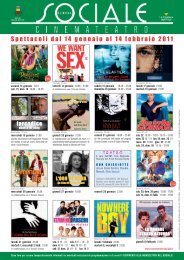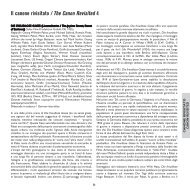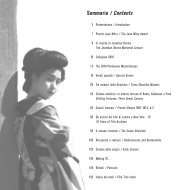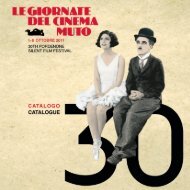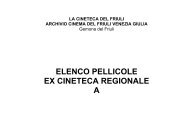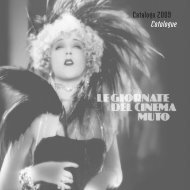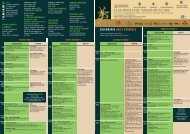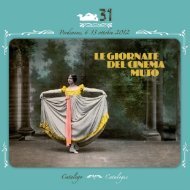Le Giornate del Cinema Muto 2005 Sommario / Contents
Le Giornate del Cinema Muto 2005 Sommario / Contents
Le Giornate del Cinema Muto 2005 Sommario / Contents
You also want an ePaper? Increase the reach of your titles
YUMPU automatically turns print PDFs into web optimized ePapers that Google loves.
ANTONIO COPPOLA Avvicinatsoi giovanissimo alla musica, nel 1965 si iscrive al conservatorio di S. Cecilia di Roma dove studia pianoforte,<br />
composizione e direzione d’orchestra. Già dal 1973 lavora come pianista di scena per produzioni teatrali e come pianista accompagnatore per classi di<br />
danza contemporanea. Questa attività lo porta a sviluppare la tecnica <strong>del</strong>l’improvvisazione che troverà la sua massima espressione negli accompagnamenti<br />
per il cinema muto ai quali dal 1975 ha consacrato completamente la sua attività. Dal 1999 collabora intensamente con l’Octuor de France di Jean-Louis<br />
Sajot per il quale ha scritto le partiture per Paris qui dort di René Clair, Seraphin ou les jambes nues di Louis Feuillade e Visages d’enfants di Jacques<br />
Feyder, quest’ultima eseguita per la prima volta alle <strong>Giornate</strong> 2003. Nel <strong>2005</strong> apre di nuovo il festival a Sacile dirigendo la partitura da lui composta per<br />
un altro film di Feyder, Crainquebille, nella versione restaurata dalla Lobster. / He began his music studies at a very early age, and in 1965 enrolled in<br />
the conservatory of Santa Cecilia in Roma, taking courses in piano performance, orchestral conducting, and composition. From 1973 he worked as<br />
accompanist for theatrical presentations and contemporary dance classes, which led him to develop a solid and sophisticated improvisational skill. This<br />
led to an invitation in 1975 from the Rome cine-club “L’Officina” to accompany a series of silent film retrospectives. He was so fascinated and inspired<br />
by this experience that he gave up all other musical activities to concentrate exclusively on providing music for silent films. From that time he has been<br />
regularly invited to perform at film festivals and retrospectives all over the world, and has acted as research consultant to a number of universities and<br />
film archives, advising on the restoration of original soundtracks. He has also lectured and given masterclasses on techniques of improvisation and<br />
composition for silent films. At the 2003 <strong>Giornate</strong> <strong>del</strong> <strong>Cinema</strong> <strong>Muto</strong> he conducted his own original orchestral score for Jacques Feyder’s Visages d’enfants.<br />
This year, as the <strong>Giornate</strong>’s opening-night show in Sacile, he will conduct the Octuor de France in his own new score for the restored version of Feyder’s Crainquebille.<br />
Website: www.antoniocoppola.com<br />
DONALD SOSIN Ha compiuto gli studi musicali alla University of Michigan e alla Columbia University, e oggi compone, adatta e dirige concerti. Alle<br />
<strong>Giornate</strong> suona sin dal 1993, esibendosi regolarmente al Lincoln Center, al MoMA, all’ American Museum of the Moving Image, alla Brooklyn Academy of<br />
Music (BAM) e nei maggiori festival europei ed americani. <strong>Le</strong> sue compsizioni corali e strumentali sono state eseguite dallo Chicago Symphony Chorus<br />
e dal St. Luke’s Chamber Ensemble, oltre che alla radio e alla televisione. Con sua moglie, la cantante Joanna Seaton, compone ed interpreta canzoni<br />
per film muti, alcune <strong>del</strong>le quali inserite nei loro numerosi DVD. Nato il 14 ottobre, lo stesso giorno di Lillian Gish, non poteva che essere lui ad<br />
accompagnare al pianoforte The Scarlet <strong>Le</strong>tter in programma proprio quel giorno./ Composer/arranger/conductor, he has performed at the <strong>Giornate</strong> since<br />
1993, and plays regularly at Lincoln Center, MoMA, the American Museum of the Moving Image, the Brooklyn Academy of Music (BAM), and major<br />
festivals around the US and Europe. His choral and instrumental works have been performed by the Chicago Symphony Chorus and St. Luke’s Chamber<br />
Ensemble, and heard on network television and radio. He and his wife, singer Joanna Seaton, often write and perform original songs for silents, some of<br />
them featured on their numerous DVD releases. They live in Connecticut with their son Nick. Among his <strong>Giornate</strong> appearances this year will be a special<br />
piano accompaniment for the Lillian Gish birthday screening of The Scarlet <strong>Le</strong>tter. Website: www.silent-film-music.com.<br />
JOHN SWEENEY Ha lavorato molto nella danza contemporanea, sia come pianista che come compositore (recente la sua collaborazione con Andreja<br />
Rauch), rilevando una certa affinità con le tecniche di accompagnamento di film. Nato in Nuova Zelanda, suona per il cinema muto da 18 anni, soprattutto<br />
in Gran Bretagna, al National Film Theatre e ai Riverside Studios. Questo è il suo sesto anno consecutivo alle <strong>Giornate</strong>. / He has worked extensively in<br />
contemporary dance, both as a pianist and composer (recently with Andreja Rauch), and acknowledges the parallels with the techniques of playing for<br />
films. Born in New Zealand, he has been playing for films for the past 18 years, mainly in Britain at the National Film Theatre and the Riverside Studios.<br />
This is his sixth consecutive year at the <strong>Giornate</strong>.<br />
GABRIEL THIBAUDEAU Considerato lo specialista canadese per eccellenza nell’accompagnamento di film muti, ha al suo attivo la composizione di<br />
numerose partiture orchestrali. Nel 1998, la Quinzaine des réalisateurs <strong>del</strong> Festival di Cannes gli ha commissionato lo score per The Man Who Laughs<br />
(L’uomo che ride) di Paul <strong>Le</strong>ni, che ha portato in tutto il mondo con l’Octuor de France. Nel 1999, il suo accompagnamento orchestrale per Au Bonheur<br />
des Dames (Il tempio <strong>del</strong>le tentazioni) di Julien Duvivier ha vinto il Prix Château-Pape-Clément, “Coup de cœur” al Pessac Festival, in Francia. Ed è<br />
proprio questo il film prescelto per la pre-inaugurazione al nuovo Verdi di Pordenone <strong>del</strong>le <strong>Giornate</strong> <strong>2005</strong>. Ma la sua partitura più recente è quella per<br />
Nanook di Robert Flaherty, presentata in prima mondiale, il 16 settembre, al XXX Festival di Toronto, un lavoro che lo ha visto impegnato per anni e che<br />
integra musica contemporanea e canti tradizionali eschimesi. / Composer and pianist by appointment to the Cinémathèque Québécoise since 1988, he is<br />
recognized as the leading Canadian specialist in music for silent film. Among other orchestral accompaniments, in 1998 he was commissioned by the<br />
Cannes Film Festival to compose a score for Paul <strong>Le</strong>ni’s The Man Who Laughs, which he has subsequently performed around the world with the Octuor<br />
148



